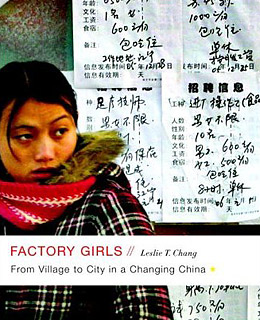This review contains affiliate links, which earn me a small commission when you click and purchase, at no extra cost to you. Thank you for supporting my small business and allowing me to continue providing you a reliable resource for clean book ratings.
Our author, Leslie Chang, is Chinese-American. This puts her in a unique position in China — she is familiar-looking, she has credibility just for having Chinese ancestry and speaking Mandarin. But she also speaks English and was raised in the golden land of America, and this combination leads her to a few pretty unique relationships. Namely, Chang gets to know, over a three-year period, two “factory girls,” girls from small villages in rural China who have left home for the industrial city of Dongguan, where they hope to work hard and change their fortunes.
Life in Dongguan is hard and lonely. Girls arrive so young and inexperienced, and the work they have to do is monotonous and incredibly low-paying. They are alone, in a huge city, living in a dorm with dozens of women with only a tiny space for themselves. Yet, they have this incredible ability to see this life as an “opportunity” and a chance to “better themselves.” They do NOT give up! They hop from factory to factory, hoping for a little bit better pay or a job that they feel is a little higher up in the social hierarchy. They send money back home and spend the rest on themselves, usually on “self-improvements” like learning English. Our author joins them on lunches and in their factories and even takes a trip home to the village. And along the way we learn about real life in China from the point of view of someone who can be both objective and understanding.
While this book is mainly the migrant story of two young girls in a vast sea of, literally, millions, it is also Chang’s story. While learning about migrants in today’s world, she looks at Chinese migration in recent history and her own ancestors’ migrations from city to town and back, to America and back, as well as her family’s experiences as a result of the communist revolution. While I really liked reading her own story, it almost felt like a different book sometimes — like it might have worked better as a separate book. I just would’ve liked the fusion to fit a little better. But it was all interesting, sometimes fascinating, what her ancestors went through. Maybe I would’ve just preferred it edited differently so I didn’t feel so jarred back and forth.
I think that anyone who wants to be able to get a solid sense of China today and the massive changes that are happening in Chinese society should absolutely give this book a try.
Rated: Moderate for four uses of strong language and some talk of sex but no scenes or descriptions at all.
Click here to purchase your copy of Factory Girls on Amazon.




